The Golden Age of Jewish Boxing
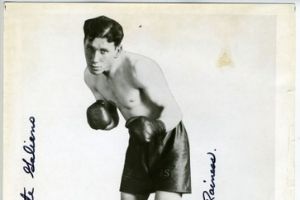
 A blog post by Dr. Deb Weiner.
A blog post by Dr. Deb Weiner.
Lately my head has been in the “interwar era,” as historians refer to the time period between World War I and World War II. In American history, this period is characterized by two major events: Prohibition in the 1920s and the Great Depression of the 1930s. What I recently discovered aboutBaltimoreJewish history is that it can also be characterized as “The Golden Age of Boxing.”
Yes, I know that might seem a bit unexpected. But as usual, the JMM collections tell a fascinating tale:BaltimoreJewish boxers, trainers, managers, promoters, and gamblers played a major role in the sport of boxing during the 1920s and 1930s. Here is just a sampling of what I found in our archives.
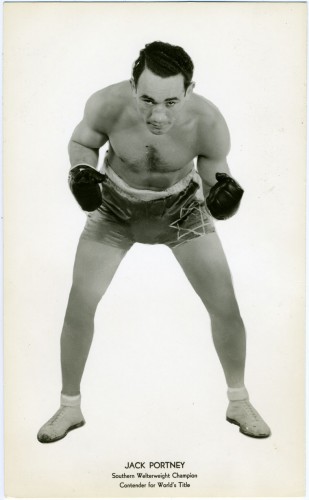
Jack Portney grew up on the streets of Baltimore, selling newspapers and “learning to fight to protect his corner from bigger newsboys who wanted his territory,” according to the Baltimore Sun. He entered the ring in 1926 and retired twelve years later with a record of 150 wins and 15 losses. Although he suffered not a single knockout and defeated six former champions, he never got a chance at a title fight in theU.S.—because of discrimination, he claimed: no one would give him a title fight because he was a southpaw. But he did become Southern Welterweight Champion and in 1936, he won the national welterweight championship ofAustralia. After he retired, he started a billiard and bowling supply company that evolved into Jack Portney’s Sporting Goods.
Abraham Sobel was an East Baltimore boy, son of immigrants, with a penchant for daring athletic feats. He would swim from Pratt Street to Federal Hill, retrieving watermelons and cantaloupes that fell from produce boats (the owners would pay him a nickel). He liked to climb the Shot Tower and the steeple of St. Leo’s Church. He became a boxer in the early 1920s and worked out at Freddie Barth’s gym on Fleet Street. He was 5 feet 4 inches tall, weighed 95 pounds, and “was known for being fast and shifty,” according to his Sun obituary. He boxed until 1929, compiling a record of 18 wins, 1 loss, and 1 draw. After boxing, he had a 47-year career as a master plumber.
Leon Luckman began fighting as a teenager in East Baltimore. He entered the ring as an amateur at age fourteen, taking the name Izzy Caplan because he didn’t want his parents to know that he was a boxer. (He chose “Izzy” from “a noted flyweight of the era” and “Caplan” from a world featherweight champion.) A “scrappy, left-handed 112-pound flyweight,” he held the local record for most amateur championships at the city, state, and regional levels. He turned pro in 1933, winning his first ten fights. He later became a fight promoter and owner of a Highlandtown bar.
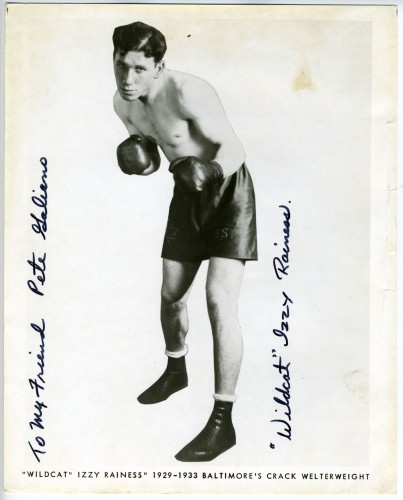
Izzy Rainess liked to frequent Pimlico Racetrack as a lad, where he earned pocket money by parking cars. He was discovered by a jockey’s agent impressed with his prowess during fights among parking attendants. The agent introduced Rainess to boxing, which he took to immediately, earning the name “Wildcat” because of the way he tore into his opponents. The 5’7”, 145-lb. brawler fought his first pro match in 1932 and proved to be a popular local star, winning 26 of 28 professional fights, with two draws and no defeats.
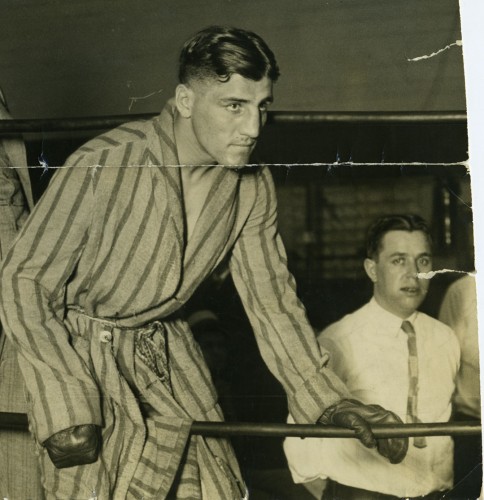
Harry “Heinie” Blaustein was considered Baltimore’s finest boxing trainer, guiding several boxers to world titles in a career that extended from the 1920s into the 1970s. In the twenties, he became associated with theDundee brothers Vince and Joe, Italian immigrants, who would both become title holders under his care. An “expert boxing instructor and a masterful cornerman,” he was known for the portable apothecary he brought with him to the ring, to tend to his wounded fighters. “I don’t tell nobody what I use,” he once confided. “It’s special preparations my nephew, the pharmacist, prepares for me.”
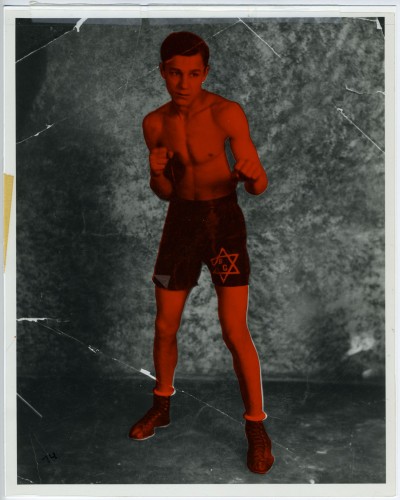

13 replies on “The Golden Age of Jewish Boxing”
Did you ever hear of Willie Jackson who beat the best of his time from 1917-1923. He was never allowed to fight for a title.
Fascinating. I am a baltimorean and lifelong boxing fan. how can i see the collection or get more info from you. Please contact me.
re Lou
Dear Lou – the best place to start is with our online collections database: http://jmm.pastperfect-online.com/00005cgi/mweb.exe?request=ks Once you’ve looked through there you should contact our collections manager, Joanna Church at jchurch@jewishmuseummd.org about setting up a research appointment! I also want to let you know that we have a great program coming up on December 11th at 1pm with Mike Silver, author of “Stars in the Ring: Jewish Champions in the Golden Age of Boxing.” More info on the program is here: http://jewishmuseummd.org/single/stars-in-the-ring-jewish-champions-in-the-golden-age-of-boxing/
Thanks for getting in touch!
-Rachel, JMM Web Manager
thank you rachel
i am so sorry i missed mike silver. any idea where else he will be
anything you can send me about jewish boxing i would love
Dr Weiner—-
My father, Richard Tucker, was an amateur welter weight boxer in the time frame you are researching. I’ve seen his old newspaper clippings and a few medals from the late 1920’s and they indicate that he won many fights at venues up and down the east coast. I vividly remember him describing fight cards at Carlin’s Park that drew as many as 10,000 fans.
( I actually saw hime fight when I was about 10 years of age in 1953 as a result of his being called an anti-semitic slur. The incident occurred on a parking lot across from the Ambassador movie theatre on Liberty Heights Ave).
Please let me know if the info & clippings, etc that I have would be useful for your research— Dave Tucker
I am searching for information about Charlie Baum the boxer from Baltimore during the 1920’s. I believe he was my grandfather and I am trying to find anything about him.
Hi Jeanne,
I recommend you send an email to our research address – research@jewishmuseummd.org.
I’m not sure that we’ll be able to help much, unless Charlie was Jewish it is unlikely we would have any collections material related to him.
Good luck with your research!
Hello- I would like to respond to Jeanne Baum Ward’s comment dated July 23, 2014. She is trying to find information about her grandfather, Charlie Baum, who went missing in the mid-twenties. Based on information my grandmother gave me back in the 1960’s, Charlie Baum was her older brother. My grandmother was Neddie Baum (1898-1980) and her parents were Charles Herbert Baum (1862-1936) and Rosa Adams (1869-1959). My grandmother’s siblings included Charles, who was born in 1893 and was known as “Bunk”. I have no knowledge of what became of Ms. Ward’s grandfather, but would very much like to contact her to fill her in on his siblings and their families.
I am so sorry I haven’t seen your post until now but a lot has happened since then. I am very excited to hear that your grandmother and my grandfather were brother and sister. I would like to get in touch with you if you are still willing. I hope you see this and are able to answer. Please email me.Thanks, Jeanne Baum Ward
This was a nice article! Just to let you know – I am close to finishing the first documentary film that tells of this amazing history of when Jews Dominated the sport of boxing . Its called – Star in the Ring –
Benny Leonard, Barney Ross, Lew Tendler, Maxie Rosenbloom – All GREAT Jewish fighters.
With interview from – Bert Sugar, Budd Schulberg, Mike Silver, Doug Century, Max Baer Jr, Roy Tendler… the list goes on !
Please take a look at the website – watch the trailer and let me know what you thing!
Thanks!
Great trailer. The fact that one-third of all pro boxers in the 1920s and 1930s were Jewish would come as a shock to many. I’m looking forward to seeing the film one day!
Hello- I would like to respond to Jeanne Baum Ward’s comment dated July 23, 2014. She is trying to find information about her grandfather, Charlie Baum, who went missing in the mid-twenties. Based on information my grandmother gave me back in the 1960’s, Charlie Baum was her older brother. My grandmother was Neddie Baum (1898-1980) and her parents were Charles Herbert Baum (1862-1936) and Rosa Adams (1869-1959). My grandmother’s siblings included Charles, who was born in 1893 and was known as “Bunk”. I have no knowledge of what became of Ms. Ward’s grandfather, but would very much like to contact her to fill her in on his siblings and their families.
This article was a real “knock out”. Who knew?